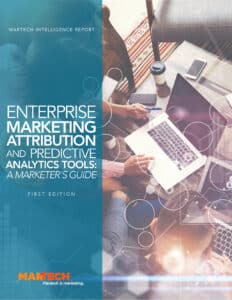[ad_1]
To engage customers in a personal way, at a very large scale, AI or machine learning is essential. Chatbots and intelligent assistants are already leading client interactions, and AI-generated content is around the corner. AI also enables the analysis and interpretation of data at a speed and volume beyond human capabilities. Algorithms are continuing to improve as well, accelerating optimization in near real-time. As AI improves, use-cases are only going to increase.
Artificial intelligence (AI) in marketing leverages machine learning to make automated decisions. With AI, brands can boost the ROI of marketing campaigns through predictive modeling, advanced segmentation, and personalization.
In this piece, we will dive deep into the value of AI technologies in marketing. We’ll cover:
Estimated reading time: 8 minutes
Why AI marketing matters
AI has transformed digital marketing and reduced the risk of human error while streamlining marketing campaigns. To truly connect with customers, you’ll still need the human touch — especially concerning compassion, empathy, and storytelling. However, when it comes to certain aspects of marketing, like predictive analytics and digital advertising, AI is capable of incredible things. For example, when your goal is to understand your customers’ needs and match them to appropriate products or services, this is where AI shines.
A 2020 McKinsey survey found that those working in marketing and sales had the third-highest rate of AI adoption. What’s more, the survey reported that “A small contingent of respondents coming from a variety of industries attribute 20 percent or more of their organizations’ earnings before interest and taxes (EBIT) to AI.”
Since then, AI use in marketing has continued to grow. As rates of use increase, if you don’t consider implementing these technologies, your brand risks being left behind. Your competitors will adopt AI strategies to improve their business outcomes, allowing them to increase sales, boost customer retention, and more effectively launch new products.

Know how your customers interact with your advertising today and into the future. Explore the platforms essential to predictive analytics and marketing attribution in the latest edition of this MarTech Intelligence Report.
Benefits of artificial intelligence in B2B marketing
There are plenty of artificial intelligence marketing tools designed specifically for business sales, allowing B2B vendors to leverage the power of personalization, machine learning, and more. From AI-powered workflows to automated next best action features, AI is helping companies solve challenges specific to B2B.
Here are some of the benefits of artificial intelligence in B2B marketing.
Campaign ROI. With the help of AI technology, B2B marketers can better predict the performance of data and campaigns. They can then make suggestions for optimizing those campaigns to reach the maximum ROI. When leveraged effectively, marketers can use AI to transform their marketing campaigns, extracting the most valuable insights to act on them in real-time — for example, analyzing the most effective ad placements to increase engagement.
Better informed decisions. Data integration automation replaces manual processing to enable faster, real-time decision-making. The goal is to gain promptly actionable customer insights. For example, with the help of predictive analytics, you can access buying patterns that help forecast purchasing decisions. Since these buying patterns are often more complex to spot in a B2B model than in a B2C model, the help of AI can be a game-changer.
Marketing metrics. The ability to track the effectiveness of campaigns can significantly affect your marketing ROI. Artificial intelligence can help monitor the outcomes of countless customer touchpoints, thus supporting campaign optimization.
Better data management. AI marketing tools also help to significantly reduce the risk of improper data interpretation, support optimal data integration, and eliminate data silos. An AI marketing tool is software that leverages AI technology to automate decisions based on collected data.
Components of artificial intelligence
Artificial intelligence encompasses various features and capabilities that can scale your marketing programs. Here are some of the main components.
Machine learning. Unlike task automation, which is fairly limited, machine learning relies on algorithms trained to use large quantities of data to make complex predictions and decisions. Machine learning models can decipher text, recognize images, perform audience segmentation, and even anticipate how customers are likely to respond to various initiatives. More importantly, as the name implies, it can correct and improve itself without supervision (although some human supervision is often involved).
AI-powered platforms. Many marketing platforms today have AI “baked in,” using it to analyze and drive insights across large pools of data. Most of the large marketing suites have AI components providing cross-platform support for the solutions the suites offer. Examples are Salesforce’s Einstein and Adobe’s Sensei.
Platforms to perform specific
kinds of work are also available, for example, AI-powered content creation platforms. Some solutions offer draft content for emails or specific social media platforms, such as Twitter. Other solutions optimize content for SEO.
Big data and analytics. Collecting data is one thing — effectively analyzing it is another. AI presents one solution to the challenge of analyzing and interpreting data at a scale beyond the reach of human beings. Using AI in B2B marketing can efficiently analyze immense amounts of data, link that data, recognize patterns, and drive predictions. The more data AI is given, the better it can learn and improve., but there is still a lack of emotional intelligence. For this reason, as well as the need for human supervision (e.g., data stewardship, the maintenance of data catalogs, etc.), people continue to play a vital role in data management and analytics.
Examples of artificial intelligence in marketing
Many companies across all industries are implementing unique AI marketing strategies. Here are some common examples.
AI chatbots. STCHealth uses intelligent chatbots to answer vaccine-related questions and help people access their immunization records. Botco.ai, an automated, AI-powered conversational marketing platform, made the seemingly impossible possible. Thanks to this automated platform, the company saved approximately 52,000 human hours across two million chatbot interactions.
Visual intelligence. The eBike manufacturer Serial 1 used Vizit, a visual intelligence platform that uses machine learning and AI to help the company determine what images resonate most with consumers. As a result, Serial 1 was about to optimize digital assets and boost website conversions by 98%. This use case is a prime example of how AI marketing leads to better decision-making.
AI platforms for SMBs. Mailchimp uses a tool called Smart Platform, bringing AI to the SMB market. Some of the latest tools allow SMBs to automate content creation, gain access to dynamic recommendations and leverage a new customer journey builder.
Frequently asked questions about AI marketing
While AI technologies have been around for decades, many brands still wonder how to apply them to their marketing processes. Here are some of the most common questions people ask.
How does AI differ from automation?
AI is software that is designed to mimic human thought processes and solve problems. Automation, on the other hand, refers to technologies that follow programmed rules to accomplish tasks at scale with little to no human intervention.
Brands use both of these tools to improve their marketing processes. AI, with its machine learning capabilities, can help marketers optimize demand generation and increase personalization by analyzing customer behaviors. Automation is designed to help these teams accomplish more repetitive tasks at scale.
Do marketers need AI?
In our digital world, marketers need better ways to understand audiences across different devices and channels. And while brands can still engage with their customers without AI, it’s going to become increasingly harder to scale these efforts as technologies evolve. AI is essential if brands are to engage with prospects and customers as individuals, but do so at scale.
What are some AI marketing challenges?
As mentioned, not every member of the marketing team needs to have an extensive understanding of AI to enjoy its benefits. However, if brands don’t have at least one person working with them who has this experience, it can prove difficult to incorporate it into your systems.
Brands also may not have the tools to handle the data and resource requirements of AI technologies. That’s why so many marketers are turning to marketing work management platforms and other helpful technologies to more effectively manage these demands.

Are your workflows running you, or is your team in control of them? Explore the platforms essential to marketing work management in the latest edition of this MarTech Intelligence Report.
How artificial intelligence is changing the marketing landscape
Companies can accomplish much by implementing artificial intelligence in marketing campaigns, strategies, and tools.
Whether your goal is to study consumer behavior on your website or develop tailored advertising campaigns, AI can play a pivotal role. Many digital marketing strategies can benefit significantly from these technologies, ranging from social media to SEO.
Some of the ways that AI continues to change the marketing landscape include:
- Customer acquisition and the need for personalized marketing: The digital world is fueled by data now more than ever, especially as the number of people online continues to abound with growth.
- Customer service through chatbots: Customers want their needs to be taken care of immediately, and the use of AI to power chatbots has enabled some businesses to handle customer inquiries more effectively while reducing the role of human agents.
- Advertising campaigns: Campaigns can now be more precisely optimized and targeted.
As AI continues to evolve, there are disruptions in day-to-day marketing operations. Howe
ver, it’s likely that AI technology will continue to enable sophisticated marketing strategies for years to come.
Learn more about AI marketing
Want to learn more about implementing successful machine learning and AI? We recommend the following resources:
Dive deeper into the latest marketing technology, tactics, and strategies, including those based on artificial intelligence with news from MarTech.
[ad_2]
Source link








